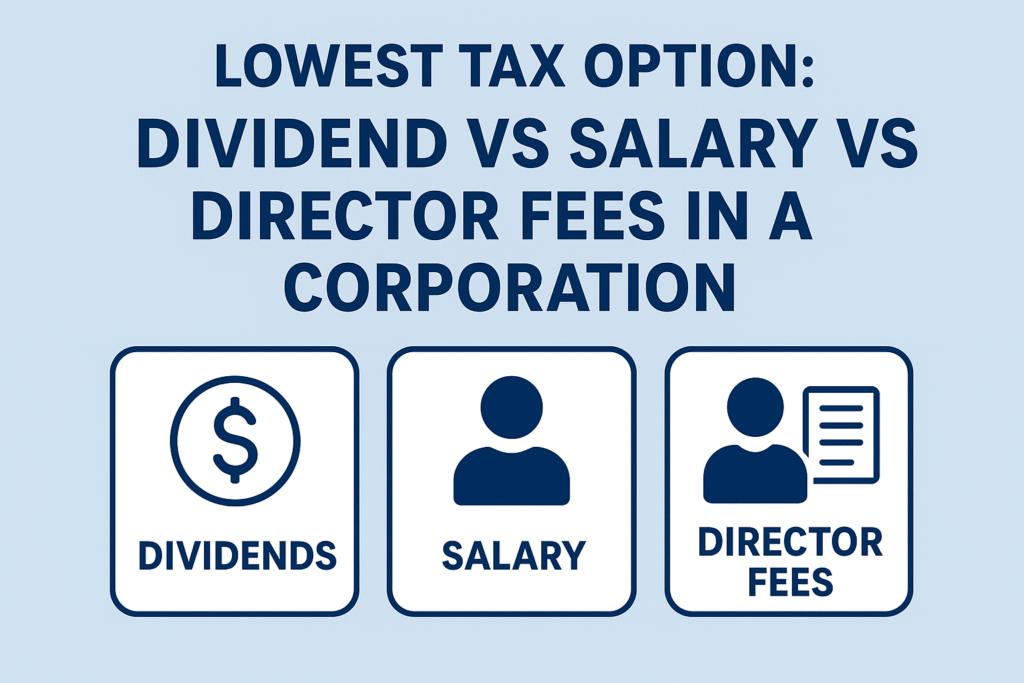Lowest Tax Option: Dividend vs. Salary vs. Director Fees in a Corporation
When you’re running a Canadian corporation, one of the biggest decisions you’ll face each year is how to pay yourself. Your choice among salary, dividends, or director fees can significantly affect your tax bill, your personal cash flow, and your ability to qualify for deductions or government programs.
Request a Free Consultation
This guide explains how each option works, how it’s taxed, and what you need to know to choose the mix that saves you the most money. By the end, you’ll also understand how a professional accounting firm like Gondaliya CPA can help you plan effectively.
Why It Matters: Understanding How You Pay Yourself Affects Taxes

When you incorporate, you take on two or more roles: shareholder, director, and possibly employee. Because of this, you have several ways to draw income from your corporation:
- Salary or wages as an employee
- Dividends as a shareholder
- Director fees for serving as a director
Each choice affects your personal income tax, corporate tax deductions, CPP contributions, RRSP room, and eligibility for benefits. The right mix can save thousands every year.
Overview of Corporate Taxation in Canada
Your corporation pays tax on its profits at corporate rates. Once profits are earned, you can withdraw them as salary or dividends. Canada’s tax system uses a principle called integration, which aims to ensure that total tax (corporate + personal) is roughly the same as if the income were earned personally.
Because of deductions, credits, and timing differences, however, there are still opportunities to optimize how you’re paid.
Dividends
What Are Dividends?
Dividends are payments of after-tax corporate profits to shareholders. They are not a business expense to the corporation, so the corporation pays tax first, and then you pay tax personally at your dividend rate.
How Dividends Are Taxed
Dividends come in two types: eligible dividends (paid from income taxed at the general corporate rate) and non-eligible dividends (paid from income taxed at the small business rate). Eligible dividends receive a higher dividend tax credit and are taxed at a lower personal rate than non-eligible dividends.
Advantages of Dividends
- No CPP contributions, which can save significant amounts.
- Flexibility to time dividends to manage your personal tax brackets.
- Lower compliance costs compared to salary.
- Immediate cash flow, as the corporation retains more money upfront.
Disadvantages of Dividends
- No RRSP room is created.
- No CPP contributions may result in lower retirement benefits.
- Limited access to certain government credits tied to earned income.
- Personal tax may be less predictable depending on income mix.
Salary (or Wages)
What Is Salary?
Salary is employment income you pay yourself as an employee of your corporation. The corporation deducts salary as a business expense, lowering its taxable income.
How Salary Is Taxed
Salary is taxed at your personal marginal tax rate. The corporation deducts it from its income, reducing corporate taxes. Both you and the corporation make CPP contributions on salary.
Advantages of Salary
- Creates RRSP contribution room for retirement planning.
- CPP contributions increase your eventual retirement benefits.
- Reduces corporate taxable income through deductions.
- Access to personal tax credits and benefits tied to employment income.
Disadvantages of Salary
- Payroll remittances add administrative work.
- Immediate tax impact due to CPP and personal tax.
- Less flexibility since it is taxable in the year it is paid.
Director Fees
What Are Director Fees?
Director fees compensate directors for their duties and responsibilities. They are deductible to the corporation and reported as income from an office for the recipient.
How Director Fees Are Taxed
Director fees are treated as income from an office. The corporation deducts them as an expense, but CPP may be optional. Recipients receive a T4A slip rather than a T4 slip as with salary.
Advantages of Director Fees
- Deductible for the corporation.
- Flexible compensation planning.
- CPP contributions may be optional depending on arrangements.
Disadvantages of Director Fees
- No RRSP contribution room.
- Taxed as regular income with less withholding flexibility.
- Additional administrative steps for reporting.
Comparing Dividends, Salary, and Director Fees
Key Differences at a Glance
| Feature | Dividends | Salary | Director Fees |
|---|---|---|---|
| Deductible to Corporation | No | Yes | Yes |
| CPP Contributions | No | Yes | Optional |
| Creates RRSP Room | No | Yes | No |
| Personal Tax Rate | Lower (credit) | Higher | Regular income |
| Reporting Slip | T5 | T4 | T4A |
Tax Integration in Practice
While integration aims to equalize tax between corporate and personal income, small differences in rates and credits create opportunities to save money with the right planning. This is where working with an experienced CPA is most valuable.
Strategic Considerations for Choosing the Best Mix

Cash Flow vs. Retirement Savings
If your priority is cash flow now, dividends may be more attractive because you avoid CPP contributions. If your priority is building retirement savings, salary creates RRSP room and increases CPP benefits.
Stability of Income
Salary is generally more predictable and stable, making budgeting easier. Dividends can be timed for tax efficiency, which is useful if your income fluctuates year to year.
Corporate Income Level
If your corporation claims the small business deduction, dividends paid will typically be non-eligible, which affects your personal tax rate. Corporations taxed at the general rate can pay eligible dividends at lower personal rates.
Mixed Strategy
Many owners use a blend of salary and dividends — for example, a base salary to create RRSP room and contribute to CPP, then dividends for flexibility and potentially lower personal tax. Director fees are less common for owner-managers but can be helpful in certain structures.
Common Mistakes to Avoid
- Paying all dividends without considering the loss of RRSP room
- Missing payroll remittance deadlines for salary
- Ignoring integration rules, resulting in higher combined tax
- Assuming director fees automatically avoid CPP contributions without proper planning
How Professional Tax Planning Can Help
A skilled CPA can analyze your corporation’s income and your personal financial goals to design a customized compensation plan. They’ll consider:
- Your corporate income level
- Your personal income needs
- Your retirement savings goals
- Timing of income and tax brackets
Key Points on Lowest Tax Option: Dividend vs. Salary vs. Director Fees in a Corporation
- Corporations can pay owners or shareholders through salary, dividends, or director fees, each with different tax implications.
- Salary is a deductible expense for the corporation, reducing corporate taxable income, but is subject to personal income tax and payroll deductions.
- Dividends are paid from after-tax corporate profits and are taxed at a lower personal rate due to dividend tax credits.
- Director fees are considered employment income and are subject to personal income tax, CPP contributions, and EI (if applicable).
- Choosing between salary and dividends depends on personal income needs, corporate profits, and overall tax strategy.
- Salary provides RRSP contribution room, which can be beneficial for long-term retirement planning.
- Dividends do not create RRSP room but may result in lower overall tax if the recipient is in a lower tax bracket.
- Director fees can be useful for compensating board members, but may not be tax-efficient compared to dividends or salary.
- Combining salary and dividends can optimize tax efficiency while balancing cash flow needs.
- Timing of dividend payments can impact personal and corporate tax planning, especially near year-end.
- Consider income splitting with family members through dividends to reduce overall family tax burden.
- Working with a CPA helps ensure compliance with CRA rules while maximizing tax efficiency.
- Regularly review your compensation strategy to adapt to changes in corporate earnings, tax laws, or personal circumstances.
- Proper documentation of payments, including resolutions and minutes for dividends or director fees, is essential for CRA compliance.
- Understanding the trade-offs between salary, dividends, and director fees allows business owners to make informed, tax-efficient decisions.
How Gondaliya CPA Can Help You Pay the Lowest Tax
At Gondaliya CPA, we specialize in helping Ontario small business owners, professionals, and incorporated entrepreneurs structure their income to minimize taxes and maximize savings.
We offer:
- Personalized tax planning to choose the best mix of salary, dividends, and director fees
- Corporate tax compliance so you never miss a deadline or pay unnecessary penalties
- Strategic retirement planning to ensure CPP and RRSP strategies align with your goals
- Ongoing support as your business grows and your financial situation changes
With more than 20 years of combined experience in accounting and tax, our team can show you exactly how to save money while staying compliant with CRA requirements.
Next Steps
If you’re wondering whether salary, dividends, or director fees are right for you — or what mix will minimize your taxes — now is the time to get expert advice.
Contact Gondaliya CPA today to book a free consultation and discover how we can help you:
- Lower your taxes
- Maximize your take-home pay
- Build a stronger financial future
- Build a stronger financial future
There’s no one-size-fits-all answer to the question of dividends vs salary vs director fees. The best choice depends on your personal circumstances, your corporation’s income, and your long-term goals.
By working with experienced professionals like Gondaliya CPA, you can design a compensation strategy that minimizes tax, maximizes benefits, and keeps your business compliant.

Sharad Gondaliya is a CPA Canada & CPA USA with 14 Years+ experience of Accounting, Tax, Payroll of Corporate Small Businesses as Tax Accountant. He is fully certified CPA Ontario and CPA USA and is well known among corporate small businesses for tax planning, efficient tax solutions, and affordable CPA services. Sharad is the Principal (Director) of Gondaliya CPA – Affordable CPA Firm in Canada. Licenses: CPA Ontario: 61040184 | CPA USA (MT): PAC-CPAP-LIC-033176 | CPA USA (WA): 57629 | CPA Firm License: 61330051 View Full Author Bio
